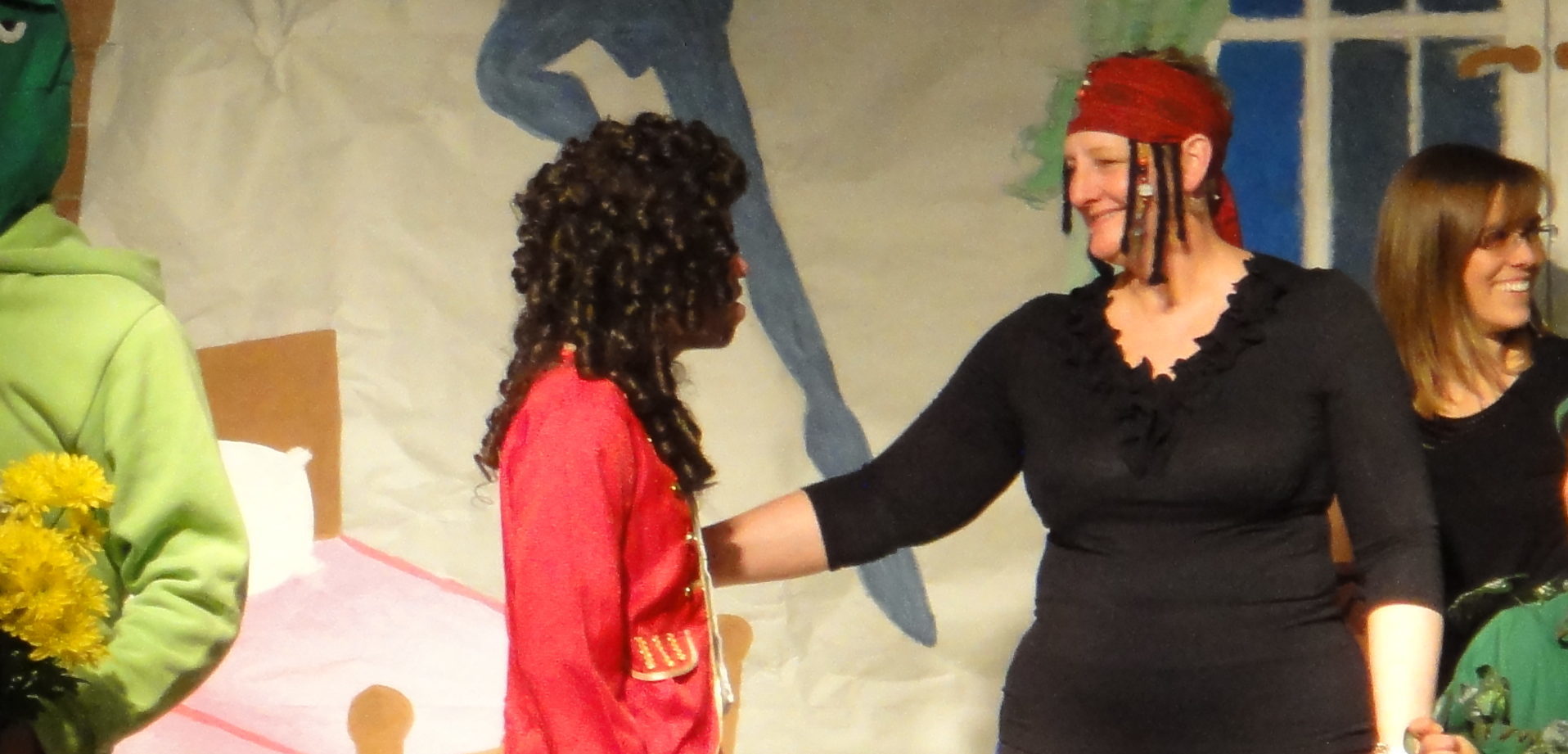How Rhythm Helped a Boy Go From Saying 1 to 6 Words At a Time
Tommy was one of the most friendly, talkative, and animated students I’d ever worked with–an absolute delight! I thought he would made a great Captain Hook for our school musical, but I was surprised when I discovered his unique challenge.
School musicals at Jordan Valley were quite the production. We were made up of 150 students with severe to profound special needs, including physical, mental, and behavioral challenges. We involved every class so each student would have a moment on stage, and requested the help of every teacher, therapist, and even some parents and administrators.
Casting was always a unique challenge. Because I worked with every child in the school twice a week I was familiar with their strengths, so I generally had a pretty good idea of who would enjoy and thrive in their experience as a lead. But we needed to have students with the focus and energy to get through practices and maintain their composure on performance day.
My choice for Peter Pan was Terri, a smiley and energetic girl from the teen class who LOVED the opportunity to shine in front of her peers. She couldn’t say a word, but she loved pretending to fly, and had a smile from here to New York City that lit up the entire stage. We programmed her lines onto a communication device that she learned to use it quickly so she could say her parts.
My choice for Wendy was Miranda, another teenage student who was animated and well aware of her surroundings. She was thrilled at the chance to be on stage! She also used a communication device. She was just learning to use a motorized wheelchair, which presented its own challenges as we tried to keep her from driving off the stage!
My choice for Captain Hook was Tommy, one of the most friendly, talkative, and animated students I’d ever worked with. He was flattered and excited when I asked him to play the part (“yeah, sure! I’d love to!”), and came to our first rehearsal ready to roll.
The First Rehearsal
Tommy came in to the rehearsal with his Speech Therapist Jolene and sat down. “Hi everyone!” He said.
“Hi Tommy, we’re so excited to have you play Captain Hook! Are you ready to learn your lines?” I asked.
“Yeah yeah, sure, I’d love to!”
Jolene told him his line: “Say ‘blast that Peter Pan!'”, she prompted.
Tommy just looked at her.
“Blast that Peter Pan”, she said again.
He looked around the room, obviously confused.
“Say ‘blast'”, she said.
He looked at her. “Uh…..blast”, he finally managed.
“That”, she prompted.
“Uh….”, he squinted his eyes as he tried to form the word. “That”, he said with great effort.
“Peter.”
“Um. Uh….P-Peter.”
“Pan”.
His face scrunched up for a few moments. “Pan.”
I looked at Jolene and we both had the same thought. This is going to be a very long musical.
Trying Music Therapy
Before this first rehearsal I had never realized that all of Tommy’s speech was “scripted”. In other words, everything he says is memorized, and he’s really good at using the right phrases at the right time. In this case we were asking him to say things he had never said before, and it was extremely difficult for him.
I decided to try using music therapy to help him put those words together. I had just finished a graduated from a master’s program that focused on music and the brain, and I wanted to see if rhythm could reach the affected speech centers in Tommy’s brain.
I brought him into the music room and sat down with two drums–one for me and one for him. I said his line rhythmically while I played the drum to support the words: “Blast that Peter Pan.”
He hardly hesitated. He played his drum and said “Uh, Blast that Peter Pan.”
I raised my eyebrows and continued to the next line, speaking and playing rhythmically. “If I could find his hideout…”
He played it back just like he heard it, “If I could find his hideout.”
I finished the line, “I’d trap him”.
“I’d trap him!” He said triumphantly.
The immediate response was remarkable. By simply adding rhythm to the lines, his brain was suddenly able to process and form the words. We practiced a few more times, then hurried to Jolene’s office with our drums to show her what Tommy could do.
Generalizing
 For the first few practices after the rhythm discovery, Jolene attempted to prompt Tommy’s lines with rhythm, but if it wasn’t quite what he had practiced then he gave her that blank look. When this happened I demonstrated the rhythm for her, she’d repeat it for him, and he’d get it. He had quite a few lines in the play, so it took some practice, but over time he didn’t need rhythm anymore.
For the first few practices after the rhythm discovery, Jolene attempted to prompt Tommy’s lines with rhythm, but if it wasn’t quite what he had practiced then he gave her that blank look. When this happened I demonstrated the rhythm for her, she’d repeat it for him, and he’d get it. He had quite a few lines in the play, so it took some practice, but over time he didn’t need rhythm anymore.
Once the actual play came around, he had his lines memorized to the point where all he needed was the first word.
He said his lines with such fluidity that you would never know he started with just one word at a time.
But really, don’t we all?

